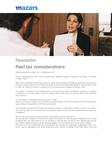
Paef tax considerations
Fiscal considerations of the Formal Employment Support Program (Programa de Apoyo al Empleo Formal -Paef-).
Within the framework of the new economic, social and ecological emergency declared in the national territory through Decree 637 of 2020, the National Government issued Legislative Decree 639 of May 8, 2020, by means of which it created the Formal Employment Support Program -Paef-.
The above, to protect formal employment in the country during the pandemic, granting a monetary contribution of a state nature aimed at legal entities that meet, in general terms, the following requirements:
To have been incorporated before January 1, 2020.
Have a commercial registry that has been renewed at least in 2019 (this requirement only applies to legal entities incorporated in 2018 and prior years).
Demonstrate the need for the state contribution, certifying a decrease of 20% or more in its income. It should be noted at this point that the regulation does not provide the methodology to make the comparison.
Not having received the support program contribution on three occasions.
Not having been obliged to reimburse the state contribution for having used it improperly, not having complied with the requirements for its granting or having been found to have falsified documents provided to qualify as beneficiaries (see paragraphs 1 to 3 of Article 8 of Decree 639 of 2020).
The amount of the contribution will correspond to the number of employees multiplied by $351,121, which may be requested up to three times during the months of validity of the Paef (May, June and July). For beneficiaries who have also accessed the payroll credit lines supported by the National Guarantee Fund, the term will be extended until August 2020.
It follows from the foregoing that the Paef is a state contribution in cash that must be used solely and exclusively for the payment of salaries of the beneficiary's (employer's) formal jobs. Any other use will make the beneficiary liable to disciplinary, fiscal, and criminal sanctions.
The other requirements, terms, controls, conditions and sanctions are expressly provided for in the aforementioned decree.
What is not observed in the regulation is the income tax treatment that the beneficiary must consider when receiving the contribution, for which the following clarifications should be made:
In principle, it should be noted that, according to the law (Article 21-1 of the Tax Statute -ET-), for income tax purposes, the recognition and measurement systems must be applied, in accordance with the technical accounting regulatory frameworks in force, when the tax law expressly refers to them and in the cases in which this does not regulate the matter.
As already mentioned, Decree 639 did not say anything regarding the tax treatment, so it is of great importance to resort to the accounting rule according to which, whether it is the International Standard for SMEs (section 24) or the Full Standard (IAS 20), this type of subsidies or government grants to support the payment of payroll must be recognized as income for the period.
However, being an income for tax purposes, the question arises as to whether it is ordinary income or occasional gain.
For this purpose, it should be noted that the income constituting occasional gains are only those expressly provided for in articles 299 to 317 of the ET, which do not properly include state subsidies to protect payroll, such as the one provided for in Decree 639.
From a tax point of view, the depuration of the net income is based on the sum of all ordinary and extraordinary income realized in the taxable year or period, susceptible of producing a net increase of the net worth at the time of its receipt, and which have not been expressly exempted.
In the case of the state contributions, it is observed that they effectively correspond to an inflow that increases the net worth of the beneficiary employer, since they support him in the payment of the payroll of the workers whose jobs are to be protected, without the beneficiary being obliged to the State to perform a different service other than to allocate the support received in due form.
Additionally, Decree 639 did not foresee an exceptional tax treatment for the contributions (for example, it did not provide for a handling as income not constituting income or occasional gain), so that, appealing to the rule of liquid income purification (article 26 of the ET), the treatment must correspond to that of a taxable income for purposes of this income tax.
It follows from such conclusion that state contributions should be subject to withholding at source for income tax purposes by the financial entity channeling the payments (at the rate of 2.5%) and to the special income self-withholding provided for in Decree 2201 of 2016 (compiled in Decree 1625 of 2016).
Under the program, the decree noted that financial commissions will be excluded from VAT and resource transfers will be exempt from the tax on financial movements -GMF-.
Finally, the state support is not subject to ICA, since it does not derive from the exercise of activities taxed with that tax.


